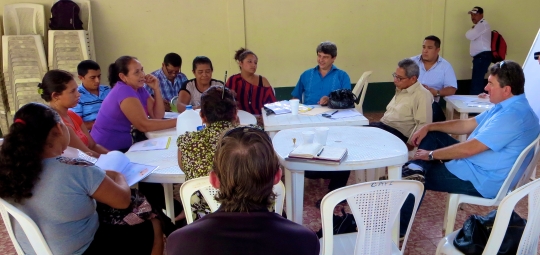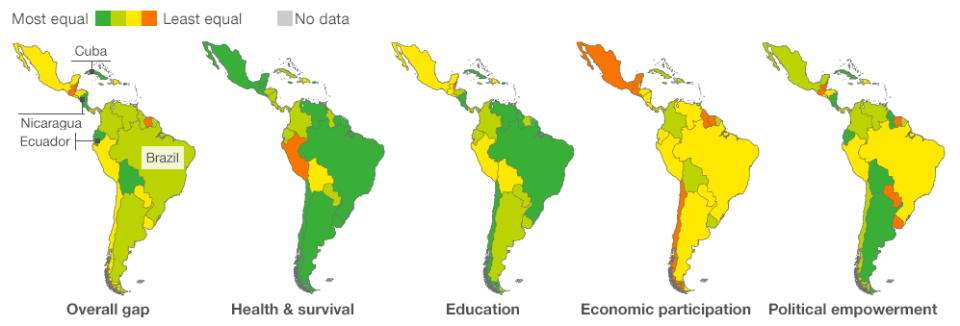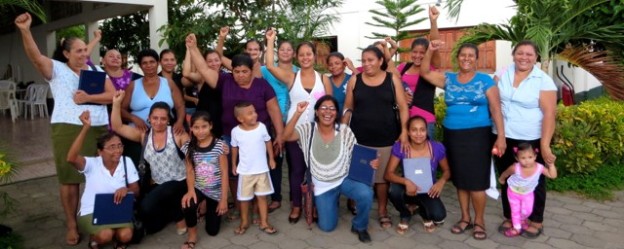First-ever initiative to count the unpaid work of women in agricultural commodity production is successful in Nicaragua
Ético: The Ethical Trading Company Ltd., British NGO Social Business Network, and Nicaraguan farmer cooperatives celebrate the ground-breaking innovation to Recognise the Unpaid Work of Women in Ethical Supply Chains.
Ético: The Ethical Trading Company and British NGO Social Business Network are pioneering the first ever initiative to Recognise the Unpaid Work of Women in Ethical Supply Chains. Traditionally, the price for commodity products include only direct input and labour costs, and fail to recognize or take into account the supporting unpaid work which is done mainly by women. This is the first time that rural women’s unpaid work has been recognized as a necessary input into production and one that should be valued and remunerated. This initiative was presented on July 3, 2013 to a group of 100 invitees, including representatives from Fair Trade companies Twin, Equal Exchange, and Liberation Nuts, the Nicaraguan Embassy, UK Government officials and Tesco. The event was organized by Ético and Social Business Network, with support from Hoare’s Bank, the Bulldog Trust, and Raleigh International. The speakers explained the pilot stages and preliminary evaluation of the initiative with small-farmer sesame and coffee Cooperatives in Nicaragua.
The initiative developed in 2008 during a visit of the Body Shop with the Juan Francisco Paz Silva Cooperative in Achuapa, Nicaragua. Ético gender advisor Catherine Hoskyns conducted a pilot study of women’s labour in sesame production. Her initial findings revealed that when women’s indirect labour (eg. cooking food for field labourers) and more general domestic work are included, this counts for around 22% of the total labour input in sesame. The results of the study were used to apply an additional cost to the price of the sesame oil for cosmetics, and has since been used to apply similar costs to the sales of coffee from Nicaraguan Cooperatives. The Cooperatives use the increase in price margin to organize women’s empowerment activities in their communities, such as education, savings and loans schemes and labour organisation, which bring women together and strengthen the cooperatives.

Left to Right: (Back row) Liberty Pegg, Felicity Butler, Albert Tucker, Nick Hoskyns, Christina Archer (Front Row) Catherine Hoskyns, Rachel Lindsay, Julia Perez. Photo Credit: George Selwyn
The event on July 3 demonstrated the transformative power of integrated supply chains. It was held at 2 Temple Place and chaired by Albert Tucker, Director of Social Business Network. The opening speech was given by Fiona Woolf, Lord Mayor Elect of the City of London and Trustee of Raleigh International, whose inspiration to support the event came from a visit to Nicaragua in 2012 where she was present at a meeting of women participating in the initiative. She spoke of the impact that listening to the women’s experiences working with the program of the cooperative, and concluded, “That’s why… I will also be a champion for the unpaid work of women. I think it has huge applications across the developed world as well as in the developing world.” A vivid account of the different types of unpaid work which women do in Nicaragua was given by Julia Perez, of Achuapa Nicaragua, and Liberty Pegg, a former volunteer with Raleigh International. Catherine Hoskyns explained the initial calculation of women’s unpaid labour in sesame production and its significance, and Felicity Butler gave her first findings about the impact of the initiative. She is researching this through her Ph.D. at Royal Holloway University, which funded by the Economic and Social Research Council (ESRC) and The Body Shop. Rachel Lindsay, representative of Social Business Network in Nicaragua, gave an overview of how this concept has been piloted in coffee sales and the support it has generated from the entire supply chain. Christina Archer, Senior Buyer for Community Fair Trade Ingredients at the Body Shop, gave a testimony, emphasising that “This initiative does also make really good business sense, and strengthens the sustainability of supply chains… Our brand is about building self-esteem and empowering women, be they the women who use our products or the women in our supply chains”. The event was concluded by Nick Hoskyns, Founding Director of Ético, who emphasised that when you bring together committed partners, you can use business to effect real change. He emphasised that it was not easy to get this far but “with such good collaborators, many of whom are present, we have shown that we can still make trade fairer, just as we did with the establishment of Fair Trade”. He also credited the cooperative organisations with being instrumental in the implementation of this initiative and using the additional funds so effectively for women’s empowerment.






